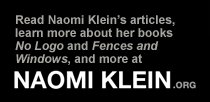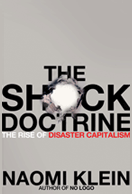The Shock Doctrine

Disaster Capitalism in Action: bailout
Bailed Out Banks Give $1.6 Billion to Executives
Frank Bass and Rita Beamish, Associated Press, December 22, 2008
"Banks that have their hands out in Washington this year were handing out multimillion-dollar rewards to their executives last year. The 116 banks that so far have received taxpayer dollars to boost them through the economic crisis gave their top tier of executives nearly $1.6 billion in salaries, bonuses and other benefits in 2007, an Associated Press analysis found.
"That amount, spread among the 600 highest paid bank executives, would cover the bailout money given to several banks that have shared in the $188 billion that Washington has doled out in rescue packages so far.
"Some banks trimmed their executive compensation in the face of faltering performance that foreshadowed the current economic crisis, but they still granted multimillion-dollar packages. Benefits included cash bonuses, stock options, personal use of company jets and chauffeurs, home security, country club memberships and professional money management, the AP review of federal securities documents found."
Banks Refuse to Publicly Disclose How Bailout Money is Being Spent
Matt Apuzzo, Associated Press, December 22, 2008
"'We've lent some of it. We've not lent some of it. We've not given any accounting of, "Here's how we're doing it," said Thomas Kelly, a spokesman for JPMorgan Chase, which received $25 billion in emergency bailout money. 'We have not disclosed that to the public. We're declining to.'
"The Associated Press contacted 21 banks that received at least $1 billion in government money and asked four questions: How much has been spent? What was it spent on? How much is being held in savings, and what's the plan for the rest? None of the banks provided specific answers....
"No bank provided even the most basic accounting for the federal money. 'We're choosing not to disclose that,' said Kevin Heine, spokesman for Bank of New York Mellon, which received about $3 billion....Heine, the New York Mellon Corp. spokesman who said he wouldn't share spending specifics, added: 'I just would prefer if you wouldn't say that we're not going to discuss those details.'"
Senator: Executive Pay Limits in Bailout "Are All but Gone"
Amit R. Paley, Washington Post, December 15, 2008
"Congress wanted to guarantee that the $700 billion financial bailout would limit the eye-popping pay of Wall Street executives, so lawmakers included a mechanism for reviewing executive compensation and penalizing firms that break the rules. But at the last minute, the Bush administration insisted on a one-sentence change to the provision, congressional aides said. The change stipulated that the penalty would apply only to firms that received bailout funds by selling troubled assets to the government in an auction, which was the way the Treasury Department had said it planned to use the money.
"Now, however, the small change looks more like a giant loophole, according to lawmakers and legal experts. In a reversal, the Bush administration has not used auctions for any of the $335 billion committed so far from the rescue package, nor does it plan to use them in the future. Lawmakers and legal experts say the change has effectively repealed the only enforcement mechanism in the law dealing with lavish pay for top executives. 'The flimsy executive-compensation restrictions in the original bill are now all but gone,' said Sen. Charles E. Grassley (Iowa), ranking Republican on of the Senate Finance Committee....
"Congressional leaders are also concerned that the Treasury might simply choose not to enforce the rules or be unwilling to impose financial penalties that could further weaken a firm and send the economy deeper into a tailspin."
Chicago Factory Workers Win!
Michael Tarm, Associated Press, December 10, 2008
"Jubilant workers, cheering and chanting "Yes We Can," celebrated outside a Chicago factory after approving a $1.75 million agreement to end their six-day sit-in, a dispute that became a symbol of the plight of labor nationwide. Republic Windows & Doors, union leaders and Bank of America reached the deal Wednesday night.....
"Each former Republic employee will get eight weeks' salary, all accrued vacation pay and two months' paid health care, said U.S. Rep. Luis Gutierrez, who helped broker the deal. He said it works out to about $7,000 apiece."
Workers Occupying Chicago Factory Suffer as Bank of America Renegs on its $25 Billion Bailout Commitment to Extend Lending
Don Babwin, Associated Press, December 8, 2008
The nation's grim economy now has a rallying point: Employees at a window-and-door factory that went out of business have taken over the building in a siege that has come to symbolize the woes of the ordinary worker.
The Republic Windows and Doors factory closed abruptly last week after Bank of America canceled the company's financing. Since then, about 200 of the 240 laid-off workers have taken turns occupying the factory, declaring that they will not leave until getting assurances they will receive severance and accrued vacation pay....
Blagojevich on Monday ordered all state agencies to stop doing business with Bank of America to pressure the bank into using federal bailout money it received to help the laid-off workers. "We hope that this kind of leverage and pressure will encourage Bank of America to do the right thing for this business," Blagojevich said outside the plant. "Take some of that federal tax money that they've received and invest it by providing the necessary credit to this company so these workers can keep their jobs."
Democratic Sen. Dick Durbin of Illinois said he wanted to ask his fellow senators to remind banks that the bailout wasn't to be used for dividends and executive salaries. "They're for loans and credit to businesses just like Republic," he said.
See Also:
Sign the Jobs with Justice petition to support the workers occupying the Chicago factory & hold Bank of America accountable.
"How Fumbling the Bailout Led to the Chicago Sit In," by Ian Welsh for Firedoglake, December 8, 2008
Firms Receiving Bailout Funds Continue Multi-Million Dollar Sports Sponsorships
Justin Rood, ABC News, November 24, 2008
"AIG, Citibank and a number of other federally bailed-out financial institutions have no plans to cancel hundreds of millions of dollars in sports team sponsorships, even as they take billions in taxpayer support, ABC News has found....
"Struggling Citibank just sealed a multi-billion-dollar emergency "backstop" deal with the U.S. government. The financial behemoth, suffering with billions in bad mortgage-related assets on its books, recently shed 53,000 workers and saw its stock price lose over half its value. Yet it's in a 20-year contract to pay the New York Mets $400 million to name the team's new stadium 'Citi Field'....
"Citi isn't alone: Imploding insurance giant AIG is paying the British soccer team Manchester United $125 million for the privilege of having its logo appear on Man U's uniforms. That, despite the fact the firm is standing largely thanks to a $150 billion lifeline from the U.S. Treasury."
Bailout Lacks Oversight Despite Billions Pledged
Amit R. Paley, Washington Post, November 13, 2008
"The Bush administration has committed $290 billion of the $700 billion rescue package. Yet for all this activity, no formal action has been taken to fill the independent oversight posts established by Congress when it approved the bailout to prevent corruption and government waste. Nor has the first monitoring report required by lawmakers been completed, though the initial deadline has passed.
"'It's a mess,' said Eric M. Thorson, the Treasury Department's inspector general, who has been working to oversee the bailout program until the newly created position of special inspector general is filled. 'I don't think anyone understands right now how we're going to do proper oversight of this thing.'"
Treasury Department Snuck a Windfall Clause for Banks into the Bailout Bill
Amit R. Paley, Washington Post, November 10, 2008
"The financial world was fixated on Capitol Hill as Congress battled over the Bush administration's request for a $700 billion bailout of the banking industry. In the midst of this late-September drama, the Treasury Department issued a five-sentence notice that attracted almost no public attention.
"But corporate tax lawyers quickly realized the enormous implications of the document: Administration officials had just given American banks a windfall of as much as $140 billion.
"The sweeping change to two decades of tax policy escaped the notice of lawmakers for several days, as they remained consumed with the controversial bailout bill. When they found out, some legislators were furious. Some congressional staff members have privately concluded that the notice was illegal. But they have worried that saying so publicly could unravel several recent bank mergers made possible by the change and send the economy into an even deeper tailspin."
See Also:
Treasury to Review New Tax Break Plan, New York Times, November 19
Schumer Questions IRS Rule Aiding Wells-Wachovia, Reuters, October 30
Obscure Tax Breaks Increase Cost of Financial Rescue, Wall Street Journal, October 18
After Change in Tax Law, Wells Fargo Swoops In, Washington Post, October 4
Federal Reserve Refuses to Disclose Details of Loans Totalling $2 Trillion
Mark Pittman, Bob Ivry and Alison Fitzgerald, Bloomberg News, November 10, 2008
"The Federal Reserve is refusing to identify the recipients of almost $2 trillion of emergency loans from American taxpayers or the troubled assets the central bank is accepting as collateral.
"Fed Chairman Ben S. Bernanke and Treasury Secretary Henry Paulson said in September they would comply with congressional demands for transparency in a $700 billion bailout of the banking system. Two months later, as the Fed lends far more than that in separate rescue programs that didn't require approval by Congress, Americans have no idea where their money is going or what securities the banks are pledging in return....
"Bloomberg News has requested details of the Fed lending under the U.S. Freedom of Information Act and filed a federal lawsuit Nov. 7 seeking to force disclosure."
See Also:
Lawmakers, Investors Ask Fed for Lending Disclosure, Bloomberg News, November 13
What Crisis? Banking Lending is on the Rise, Say Experts
Mike Meyers, Minneapolis Star-Tribune, November 2, 2008
"The nation indeed may be facing a financial crisis, with large institutions failing in the wake of multibillion debts, but most bank-lending to business customers actually has been on the rise....
"'The story goes that they [banks] are holding on to the money or putting it into Treasury bills,' said Lawrence Christiano, a Northwestern University economist and consultant to the Federal Reserve Bank of Minneapolis. 'That seems to fly directly into the face of the evidence that's out there.'
"It's a puzzle that's getting little attention, even as hundreds of billions of taxpayer dollars are devoted to fixing a problem that seems belied by government figures. 'Their own data seems to contradict their position,' said V.V. Chari. 'It would be valuable for them to explain what they're talking about.'
"The $700 billion taxpayer bailout of large players in the financial system reminds Chari of the buildup to the Iraq war. 'The analogies with the war in Iraq are more than disturbing,' Chari said. 'We're again hearing things like: "We know things you don't know. Trust us."














